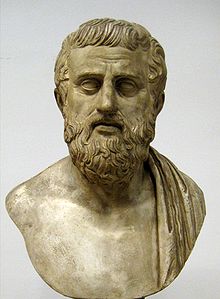Sophocles became a man of importance in the public halls of Athens as well as in the theatres. At the age of 16, he was chosen to lead the paean, a choral chant to a god, celebrating the decisive Greek sea victory over the Persians at the Battle of Salamis. The rather insufficient information about Sophocles’ civic life implies he was a well-liked man who participated in activities in society and showed remarkable artistic ability. He was also elected as one of ten strategoi, high executive officials that commanded the armed forces, as a junior colleague of Pericles. Sophocles was born extremely wealthy (his father was a wealthy armour manufacturer) and was highly educated throughout his entire life.Among Sophocles' earliest innovations was the addition of a third actor, which further reduced the role of the chorus and created greater opportunity for character development and conflict between characters. Aeschylus, who dominated Athenian playwrighting during Sophocles' early career, followed suit and adopted the third character into his own work towards the end of his life. Aristotle credits Sophocles with the introduction of skenographia, or scenery-painting. It was not until after the death of the old master Aeschylus in 456 BC that Sophocles became the pre-eminent playwright in Athens. Sophocles' work is also known for its deeper development of characters than earlier playwrights. His reputation was such that foreign rulers invited him to attend their courts, although unlike Aeschylus who died in Sicily, or Euripides who spent time in Macedon, Sophocles never accepted any of these invitations.
A number of other Sophoclean works have survived only in fragments, including:
-
- Aias Lokros (Ajax the Locrian)
- Akhaiôn Syllogos (The Gathering of the Achaeans)
- Aleadae (The Sons of Aleus)
- Creusa
- Eurypylus
- Hermione
- Inachos
- Lacaenae
- Manteis or Polyidus (The Prophets or Polyidus)
- Nauplios Katapleon (Nauplius' Arrival)
- Nauplios Pyrkaeus (Nauplius' Fires)
- Niobe
- Oeneus
- Oenomaus
- Poimenes (The Shepherds)
- Polyxene
- Syndeipnoi (The Diners, or, The Banqueters)
- Tereus
- Thyestes
- Troilus
- Phaedra
- Triptolemus
- Tyro Keiromene (Tyro Shorn)
- Tyro Anagnorizomene (Tyro Rediscovered).
-
Sophocles died at the age of ninety or ninety-one in the winter of 406/5 BC, having seen within his lifetime both the Greek triumph in the Persian Wars and the terrible bloodletting of the Peloponnesian War. As with many famous men in classical antiquity, Sophocles' death inspired a number of apocryphal stories about the cause. Perhaps the most famous is the suggestion that he died from the strain of trying to recite a long sentence from his Antigone without pausing to take a breath. Another account suggests he choked while eating grapes at the Anthesteria festival in Athens. A third account holds that he died of happiness after winning his final victory at the City Dionysia. A few months later, the comic poet wrote this eulogy in his play titled The Muses: "Blessed is Sophocles, who had a long life, was a man both happy and talented, and the writer of many good tragedies; and he ended his life well without suffering any misfortune. This is somewhat ironic, for according to some accounts his own sons tried to have him declared incompetent near the end of his life; he is said to have refuted their charge in court by reading from his as yet unproduced Oedipus at Colonus One of his sons, Iophon, and a grandson, also called Sophocles, both followed in his footsteps to become playwrights.
